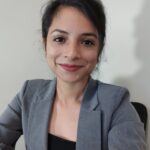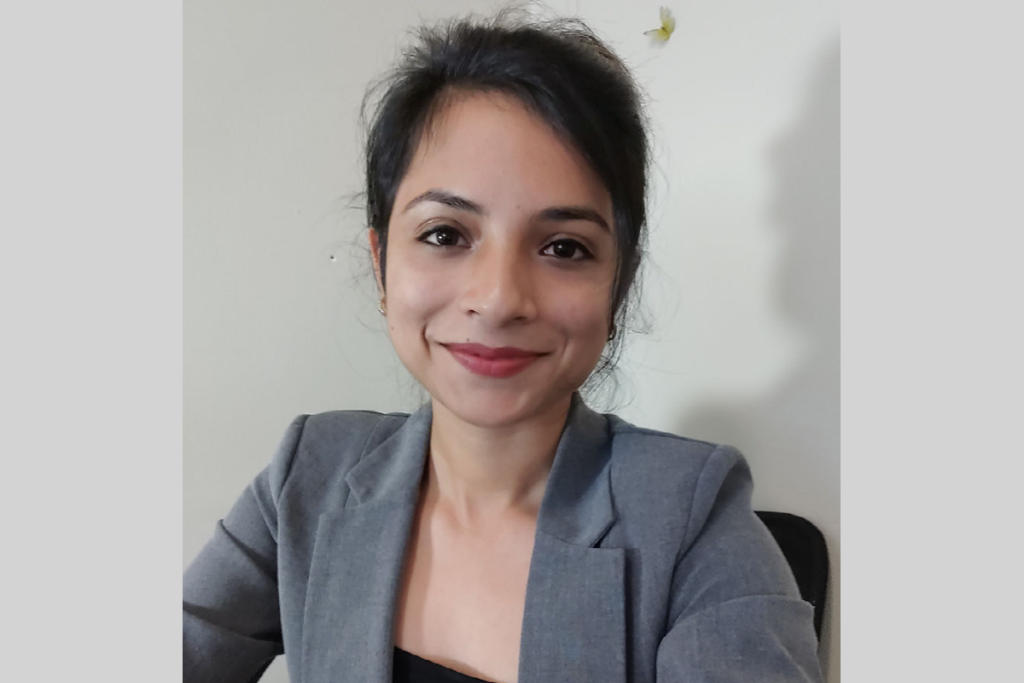We’re taking time to get to know the members of the GSA’s Early Career Scientist Committees. Join us to learn more about our 2020 early career scientist advocates.

Oindrila De
Career Development Subcommittee
Case Western Reserve University
Graduate Student
Research interest
I’m fascinated by how cells grow, change their shape, attain specialized functions, organize themselves into tissues, and form a complete organism. This basic biological process that gives rise to the adult shape is known as “morphogenesis.” Adhesive proteins that act as a glue between neighboring cells and form junctions are required in morphogenesis. These multiprotein complexes help form a physiologically tight epithelium to establish distinct organ compartments within the body and provide an effective barrier against the outside environment. Loss of this adhesiveness between cells can result in developmental defects and embryonic lethality. To completely understand the mechanisms underlying morphogenesis, I am asking the question: how do these adhesive proteins mechanistically contribute to the development of the embryo?
I’m using the embryo of the fruit fly Drosophila melanogaster to study how adhesive proteins play a role in embryonic development. In my project, I have learned that these junctional proteins do much more than just form a physical barrier. Loss of these proteins affects key cellular behaviors, including cell shape changes and rearrangements in the embryo prior to the assembly of a junction. Embryos with genetically altered forms of these adhesive proteins exhibit defects in multiple tissues, including the dorsal epidermis, salivary gland, and trachea. By employing genetic and cell biological tools and microscopic imaging techniques, I’m beginning to understand how these proteins help the cells to maintain their shape during crucial developmental events prior to forming a barrier.
As a PhD-trained scientist, you have many career options. What career options interest you the most?
Graduate school has given me various opportunities to be involved with co-organizing professional development and career exploration programs for STEM undergraduate and graduate students as well as science outreach events for high school students. Through these experiences, I have enjoyed talking to high school and college students about the kind of training I went through to pursue my higher education. During these interactions, I have noticed students havingmisconceptions about what a scientist looks like in the field, what the career options are for a PhD in science, and what skills are necessary to pursue science. While there are multiple online career resources, there still seems to be a lack of conversations that can help clear the myths about science and training opportunities that encourage and guide students interested in science careers.
My outreach experiences have influenced me to pursue career development and engagement opportunities for the next generation of science enthusiasts. I want to create programs that help high school students and STEM trainees learn about different science career options and connect them to mentors and professionals in their fields of interest. I want to create short-term projects that help students gain transferable skills that are required to be successful in any career path, such as leadership, communication, team building, time management, etc. Lastly, I want to implement these ideas in a way that is inclusive and accessible to the diverse groups of future STEM professionals. With this in mind, I’m exploring career opportunities that will allow me to design science career development courses and engagement opportunities.
In addition to your research, how else do you want to advance the scientific enterprise?
Scientific societies are putting in an incredible amount of effort to be more inclusive and provide equal opportunities. However, there is still a lack of accommodation for those who are disabled in science. As a scientific community, we need to recognize their challenges and extend our support by creating a more inclusive environment that provides career development opportunities and resources catering to their needs. We also must promote conversations that increase awareness about the importance of accessible platforms.
My sensitivity towards this topic was initially triggered by my elder brother’s blindness. Growing up with him combined with my volunteer experience at the Helen Keller Institute for Deaf and Deafblind in India has led me to constantly witness the difficulties faced by disabled students. Since then, I have always been a proponent of making science more accessible. Disabled students need the opportunity to speak with role models who can motivate them to take up STEM careers, discuss their issues, and provide resources.
As a co-organizer of Kansas DNA Day and in collaboration with the Kansas State School for the Blind, I developed an interactive classroom module for the visually challenged that teaches the basics of genetic variation with real-life research applications. I successfully conducted a pilot run of the module at the Helen Keller Institute in India and hope to launch the same module here. In the future, I want to expand this idea further by making more modules covering various biological science topics available globally for different populations, develop career resources, and provide opportunities to interact with and receive guidance from scientists with disabilities. We really need to encourage students who are passionate about science but feel discouraged to continue with higher studies in spite of lack of representation and accessibility.
As a leader within the Genetics Society of America, what do you hope to accomplish?
My academic pursuits have trained me in writing and presenting scientific findings. However, I lack the confidence and aptitude to effectively communicate my research and expertise to a broader audience both verbally and through written media. Learning science communication can really strengthen my efforts to accomplish my future goals of guiding the next generation of science professionals. I need to be able to communicate my experiences and share resources in a way that is simple, engaging, and inspiring. The Career Development Subcommittee’s “Decoding Life” interview series and other initiatives, such as career development workshops and engagements through social media, provide me with the perfect platform to master this skill. They also give me the opportunity to build my professional network and connect with scientists on career paths of my interest, so I can learn about their journeys and seek guidance.
As a leader at GSA, I would love to advocate for scientists with disabilities by demonstrating more representation on the subcommittee’s interview blogs, online workshops, and other programming. I have been using social media to interact with disabled scientists and their communities, engaging in their conversations to better understand their concerns and in what ways professional societies can help them shape their careers. I hope to be able to implement my ideas in the subcommittee’s projects by building a repertoire of career resources for the disabled who are exploring science paths. With the help of my connections at special schools and my network on social media, I would like to publish these resources in a format that is accessible to the disabled and use tools that can increase our website’s accessibility. Through GSA’s platform and the subcommittee’s guidance, I hope to be able to make all of our content more accessible and inclusive for disabled students.
Previous Leadership Experience
- Mentor for disabled students in STEM
- Special Education Module Coordinator – Kansas DNA Day
- Steering Committee Member – Scientists Exploring non-Academic Career CHoices (SEARCH) Career Symposium for STEM Trainees – University of Kansas
- Executive Officer – Molecular Biosciences Graduate Student Organization – University of Kansas













